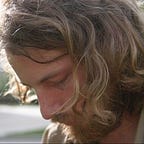Parasol
This is not the story of a vagrant, saved by compassion. It’s not an account of a wall-street broker who saw through the glazed eyes and grimy complexion of a destitute man and graciously handed over a bill that spelled the difference between life and death. Quite the opposite, actually. This is a warning about how not having enough money—as odd as this sounds—can define a life. A tale of poverty and providence.
My girlfriend stormed into my shanty apartment late one morning, shaking me awake. The night before I’d had a lone little holiday feast of nam-dok—“waterfall,” a local dish thickened with blood. I’d also drank too many Chang beers. I was sick, hungover. Maybe I was a bit homesick, too. It was Christmas after all, my second one in this country. Perhaps papaya trees weren’t so apt for decoration, geckos croaking in the shadows not the merriest of carols. To her, being a native Thai, Christmas didn’t matter. It was just another workday.
“Nam ja peurm! The villagers are yelling nam ja peurm…” She paused, trying to translate that for me, though I had an idea what it meant.
I had been studying in Thailand, and decided to stay there after graduation to travel, and to eventually film a documentary. The past few months I’d been enjoying the Thai beaches: swimming, diving, lounging in the sand sipping drinks adorned with little umbrellas. Perhaps I had overstayed my welcome—my visa had run out and I had to cross into Myanmar quite often.
I’d also run out of money. I couldn’t bear to leave paradise, though. So we’d moved to the east side of Phuket island a few days before, to save what amounted to a few dollars a month in rent. The beaches were still available now, but required an arduous journey via song teow, a local bus which looks and feels an awful lot like a prison on wheels. I’d only visited them once in the past few days, spending my days reading and writing.
“‘The water’s rising’!” she barked, her accent thick with fear.
“What?” I responded, parched from the tainted beer and heat of the late morning sun, my eyes crusted like a long-ago shucked and forgotten oyster.
“The water is rising!” she said. “Or it rose?—and they’re saying it’s about to happen again!!”
I replied after a beat, my hangover now painfully obvious: “How would they know the water is going to rise again?…What are you talking about? Flooding?” It wasn’t raining.
“The villagers are saying we have to go to the temple now—the highest part of the island…Did you not feel the earthquakes? There were earthquakes this morning and the water is going to rise!”
I had a vague recollection of the room shaking that morning, dampened no doubt by alcohol. I figured it had just been a dream. I grew up landlocked, never experiencing an earthquake, and ignorant of the ways of the sea. I was picturing an animation I’d seen on the Discovery channel as a kid, where shifting tectonic plates in the ocean could trigger a set of waves that’d grow into this monstrosity.
To me the term tsunami had always been akin to words like Godzilla. Powerful, Japanese words. After that day, tsunami feels like an English word, firmly planted in the vernacular.
The word wriggled from my lips like a good ol’ Southern boy might order the prix fixe in a crowded Paris cafe: “You think there was a tsunami?”
“What’s that?” she asked. She hadn’t grow up with the Discovery Channel.
I jumped out of bed, adorned with a tattered shirt and fisherman pants. The severity of the situation was now terribly clear. As if there were flames down the hallway, I left everything but my camera bag (luckily packed up and near the door). I didn’t know if the water was going to rise—or whatever was going on—in thirty minutes, or thirty seconds.
(Continue reading Part 2/3)
